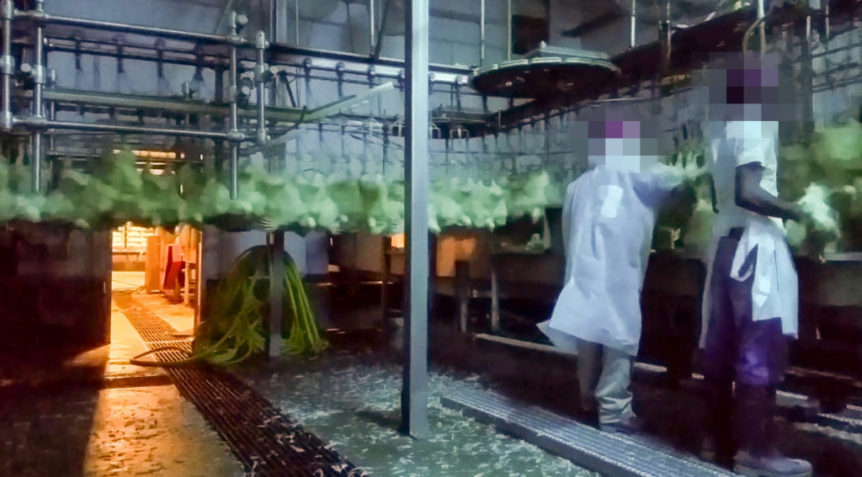- Like
- Digg
- Tumblr
- VKontakte
- Buffer
- Love This
- Odnoklassniki
- Meneame
- Blogger
- Amazon
- Yahoo Mail
- Gmail
- AOL
- Newsvine
- HackerNews
- Evernote
- MySpace
- Mail.ru
- Viadeo
- Line
- Comments
- SMS
- Viber
- Telegram
- Subscribe
- Facebook Messenger
- Kakao
- LiveJournal
- Yammer
- Edgar
- Fintel
- Mix
- Instapaper
- Copy Link
No slaughterhouse is safe for animals, and Compassion Over Killing investigations have shown that when slaughter lines run faster, animal suffering is greatly exacerbated. But animals aren’t the only ones at risk: a new report from Human Rights Watch shows that workers are suffering greatly, too.
As the Trump administration aims to dangerously increase slaughter line speeds in the name of profit–and at the expense of animals and workers–this report illuminates just why that shouldn’t be allowed to happen.
The report, “‘When We’re Dead and Buried, Our Bones Will Keep Hurting’: Workers’ Rights Under Threat in US Meat and Poultry Plants,” examines the experiences of 49 current and former workers at cow, pig, and chicken slaughter plants, as well as over 50 experts, trade union representatives, community leaders, attorneys, academic researchers, and former government officials.
Though news to some, Compassion Over Killing investigators know these dangers far too well. One of these high-speed chicken plants, Amick Farms, was investigated by Compassion Over Killing in 2018, and the investigator shared with us just how painful the work could be. Working on the live-hang line in an enclosed, ammonia-filled space, the investigator told COK, “I could not remember a time in my life that I had felt sick so frequently.”
“We’ve already gone from the line of exhaustion to the line of pain,” said Ignacio Davalos, a worker at a pig plant in Nebraska. “When we’re dead and buried, our bones will keep hurting.”
The situation is dire. As is, meatpacking is one of the most dangerous industries in the United States, and that’s just based on federal data. The report, however, points at disparities between federal data and real injury rates, indicating that injuries happen even more often than formally reported. This existing data, which accounts for about only half the country, shows that a worker suffers an amputation or is sent to the hospital for in-patient treatment about every other day. Add to that staggering statistic that chronic illnesses and injuries occur often as a result of chemical exposure and fast, repetitive motions on the line.
Many workers experience in the industry experience the debilitating Raynaud’s phenomenon, which greatly affects their lives outside of the plant. One person interviewed describes the feeling: “It feels like your hand’s getting stung by bees. Your fingertips turn ashen white. There’s an immediate loss of circulation to your hands—it’s extremely painful.… I couldn’t hold a coffee cup, couldn’t hold a pen. I couldn’t hold onto anything.”
These conditions are the rule, not the exception. And often, they’re a direct result of reckless line speeds. From the report: “Workers who spoke to Human Rights Watch corroborated decades of research that has found that rapid work speeds compound the highly repetitive, forceful movements required by meat and poultry slaughtering and processing work and increase the risk of developing musculoskeletal disorders. ‘There isn’t anyone there [at the plant] who can say, my hands don’t hurt, or my shoulders don’t hurt,’ said Abel S. a worker at a beef plant in Nebraska.136 ‘It’s because it’s too fast’.”
And those speeds are going to get faster. Though the House of Representatives is taking steps to block implementation of the new rule, the USDA seems determined to greenlight a barbaric speed increase in pig slaughter plants. Over the past year, the USDA has also been expanding its equally abusive high-speed poultry slaughter program. In its investigation of Amick Farms, not only did COK document horrible cruelty to birds, who experienced the impacts of faster line speeds firsthand, but COK’s investigator suffered crippling pain and other hand injuries, including swollen knuckles so severe the investigator’s hand could not close and the fingers would not touch when extended.
Workers deserve better. Animals deserve better. Faster line speeds can only stand to benefit the companies that are profiting off of the exploitation of human labor and animal lives. Say “no” to this cruelty today: do not give the meat industry another dollar.
To read the report, visit HRW.org.
Then, take action by signing Compassion Over Killing’s petition telling the USDA: Not so fast!

